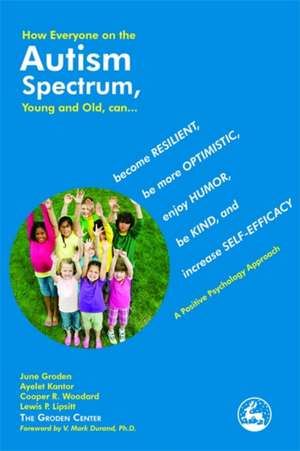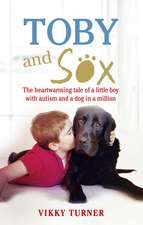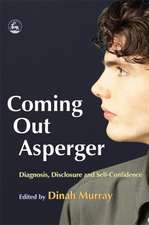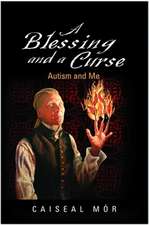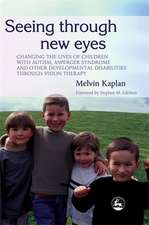How Everyone on the Autism Spectrum, Young and Old, Can...: Become Resilient, Be More Optimistic, Enjoy Humor, Be Kind, and Increase Self-Efficacy
Autor June Groden, Ayelet Kantor, Cooper R. Woodarden Limba Engleză Paperback – 30 iun 2011
Preț: 110.96 lei
Preț vechi: 139.55 lei
-20% Nou
Puncte Express: 166
Preț estimativ în valută:
21.24€ • 22.09$ • 17.53£
21.24€ • 22.09$ • 17.53£
Carte disponibilă
Livrare economică 24 martie-07 aprilie
Preluare comenzi: 021 569.72.76
Specificații
ISBN-13: 9781849058537
ISBN-10: 1849058539
Pagini: 271
Dimensiuni: 4 x 4 x 4 mm
Greutate: 0.44 kg
Editura: Jessica Kingsley Publishers Ltd
ISBN-10: 1849058539
Pagini: 271
Dimensiuni: 4 x 4 x 4 mm
Greutate: 0.44 kg
Editura: Jessica Kingsley Publishers Ltd
Notă biografică
June Groden Ph.D. has been Director of the Groden Center, an educational and treatment facility for children and adults with autism and other developmental disabilities in Providence, Rhode Island, since 1976. Dr. Groden is an adjunct professor at Salve Regina and the University of Rhode Island and is on the Panel of Professional Advisors of the Autism Society of America. She has written many books, chapters and journal articles on autism, and is well known for her work in stress and anxiety in the population with autism. Ayelet Kantor Ph.D. is an Associate Director at the Groden Center, and has worked as a parent support group consultant, as an educator in the early intervention program, and as a supervisor and coordinator of professional teams. Cooper R. Woodard Ph.D. is Director of Clinical Services and Training at the Groden Center, a visiting professor at the University of Rhode Island, a visiting professor at Wheaton College, Norton, MA, and a Board Certified Behaviour Analyst. Lewis P. Lipsitt Ph.D. is Professor Emeritus of Psychology, Medical Science, and Human Development at Brown University. He founded and directed Brown's Child Study Center for 25 years, and is an internationally known scholar in the field of child behavior and development.
Cuprins
Dedication. Acknowledgments. Foreword by V. Mark Durand, Ph.D. Introduction. What is positive psychology? Historical perspectives on developmental disabilities. An emphasis on values. ASPeCT Scale - Assessment Scale for Positive Character Traits. 1. Optimism. What is optimism? Rationale for focusing on optimism. How to nurture optimism. Changing explanatory style. Optimism in autism. Nurturing optimism in the classroom. 2. Humor. What is humor? Rationale. What's so funny? Developmental stages of humor in early childhood. Humor in people with autism. Nurturing humor in individuals with autism. Teaching the rules of humor to people with autism. Application of humor in the home and classroom. 3. Self-efficacy. Introduction. What is self-efficacy? Self-efficacy and self-esteem. The development of self-efficacy. Interpretation and judgement of outcomes. Nurturing self-efficacy in individuals with autism. Conclusion. 4. Kindness. What is kindness? Rationale - why teach kindness? Components of kindness: empathy and perspective taking. How is kindness nurtured in typical children? Kindness in autism. Conclusion. 5. Resilience. Introduction. What is resilience? Why is it important to nurture resilience in individuals with autism? Factors that make persons with autism more vulnerable and less resilient. What can be done to foster resilience? Nurturing resilience. Internal (personal) factors. External factors. Resilience-promoting intervention for individuals with autism. The expected outcome in individuals with autism. Conclusion. 6. Activities for optimism. Positive affirmations. Positive scanning. Positive expectations. Racing towards optimism. Incorporate principles of optimism into a picture rehearsal script. What optimism is and what it isn't. Dealing with problems in the most optimistic way. 7. Activities for humor. Flying balloons. Funny faces. Monkeys jumping on the bed. Cloudy with a chance of meatballs. Funny pictures. Animal surprise! Simon says. Comic strips. Joke of the day. 8. Activities for self-efficacy. Being persistent. Using an errorless learning technique. Helping at home by doing things I'm good at. Teaching social initiation and play using video modeling to increase self-efficacy in the area of social interaction. Being a good rider on the bus. Developing self-efficacy in problem-solving. Overcoming challenges. Look what I did in art class. I set my goals! Earning 'I can do it!' badges. 'I can do it' tree. 9. Activities for kindness. Identifying opportunities for performing kind acts I. Identifying opportunities for performing kind acts II. The positive pyramid. Animal therapy. Giving basket. Pass the kindness pin. Giving compliments. Kindness tree. Random acts of kindness. Secret pal. 10. Activities for resilience. Coping effectively with challenges. Problem solving basic challenges. Learning about preferences and being able to communicate likes and dislikes. Asking for help from a peer. My community. My solution is... Using the telephone. Positive assertions to build self-esteem. Step-by-step problem solving plan. 11. But wait, there's more - a photography program pulls it all together. My Own World project goals and description. Table of activities. Building an island of competence with photography activities. Photography related computer skills. 12. Measuring positive traits: The ASPeCT-DD scale. Positive traits and wellbeing. Challenges in evaluating positive traits in persons with developmental disabilities. Creation of a tool for measuring positive traits - The ASPeCT study. What we found. What it all means. References. Methods and terms. Index.
